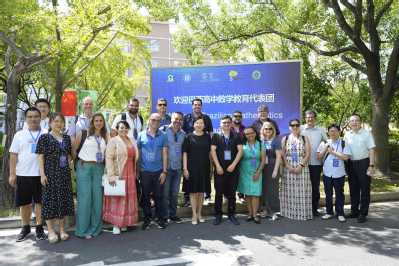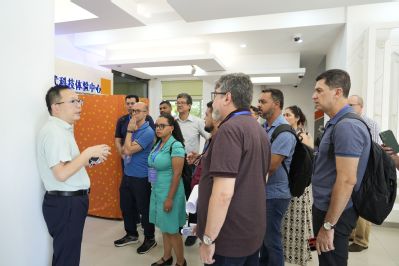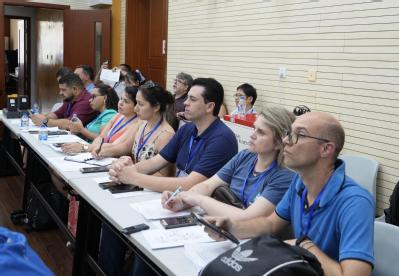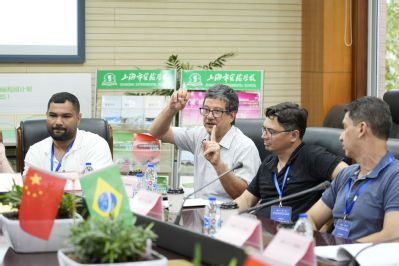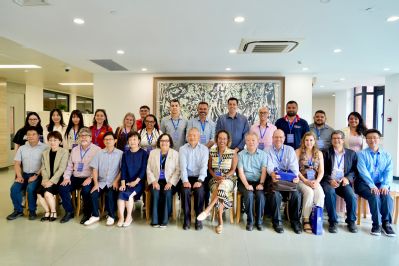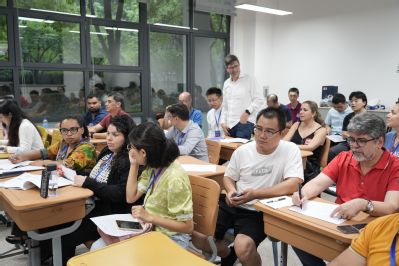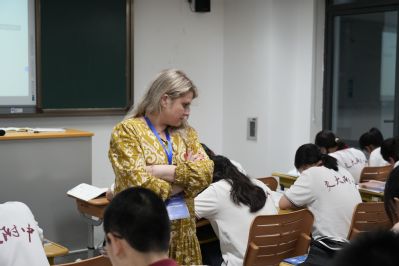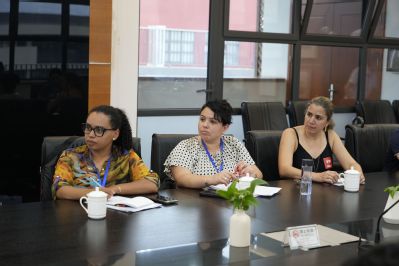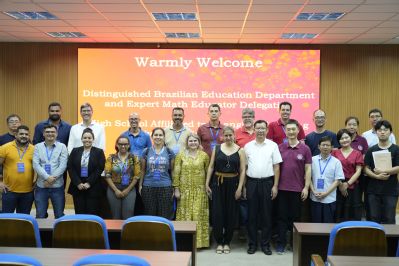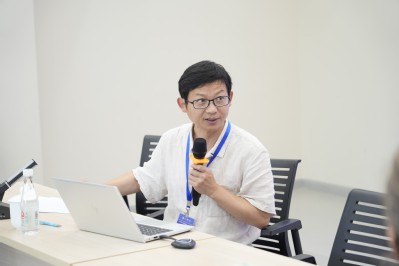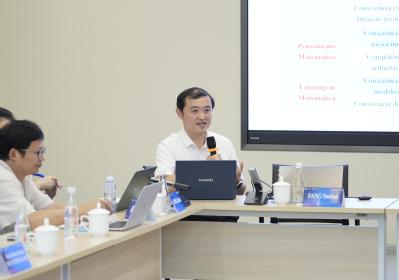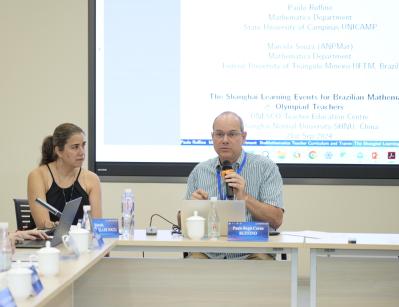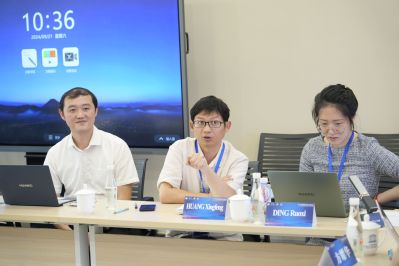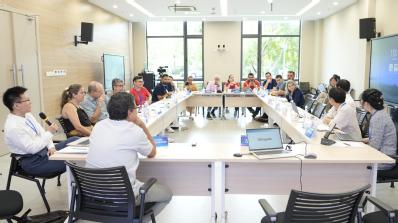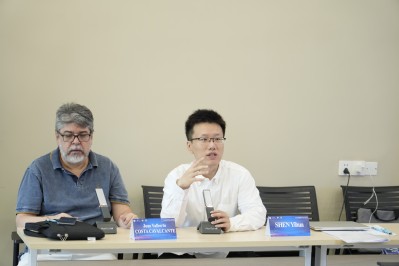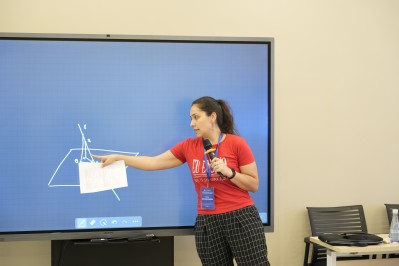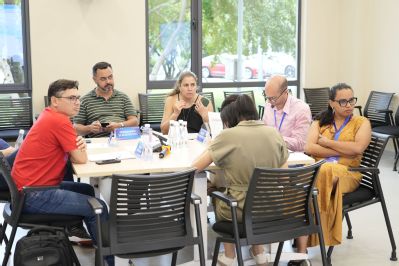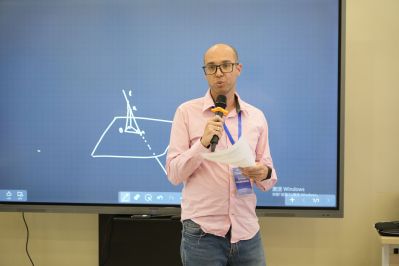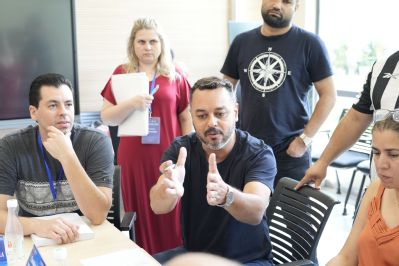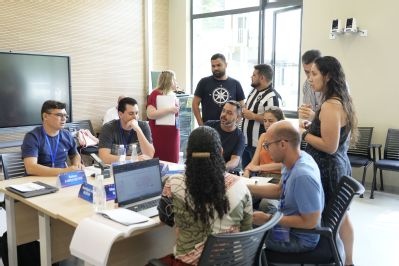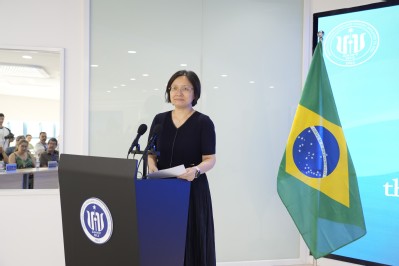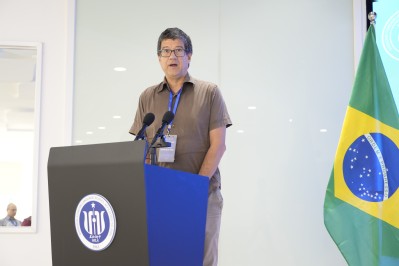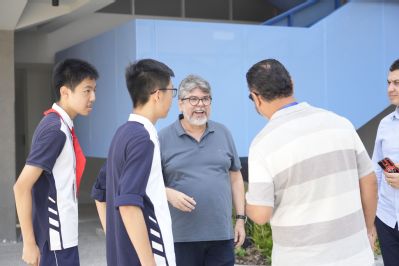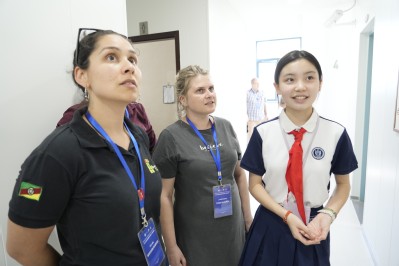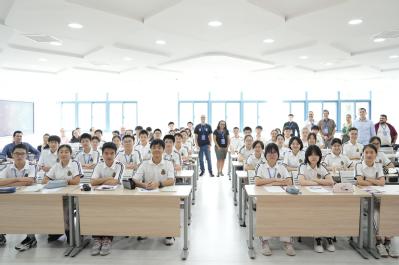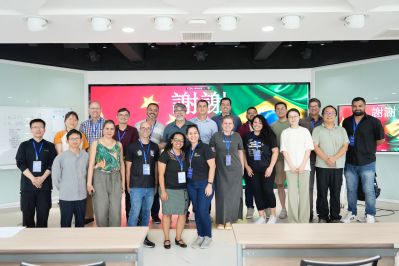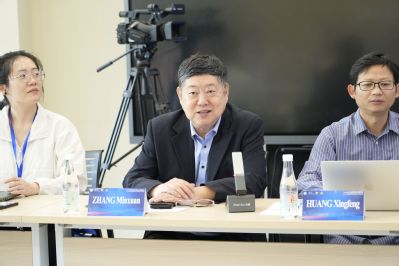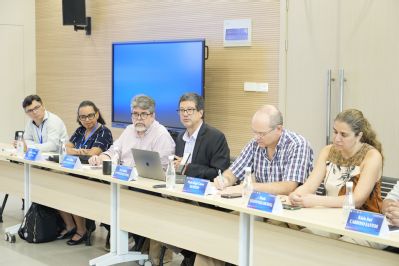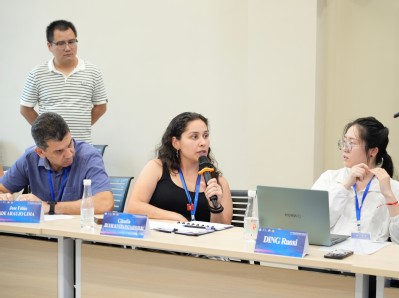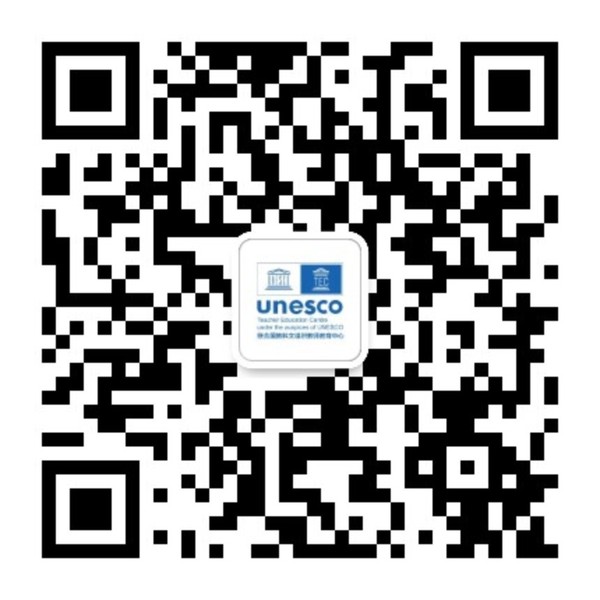On September 24, 2024, the 2024 Shanghai Training Program for Brazilian Gold Medal Mathematics Teachers, hosted by the UNESCO Teacher Education Centre (hereinafter referred to as the Centre), successfully concluded. Coinciding with the 50th anniversary of the establishment of diplomatic relations between China and Brazil, the program received strong support from multiple entities, including Brazil’s Ministry of Education, the Consulate-General of Brazil in Shanghai, and Lenovo Group. Seventeen Brazilian educational officials, scholars, and high school gold medal mathematics teachers traveled across the ocean to participate in a 9-day tour, exchange, and learning program in Shanghai. During this period, the Centre carefully organized 2 high-level dialogue sessions and 2 mathematics education seminars for the Brazilian delegation, arranged visits to 4 top high schools in Shanghai, and facilitated observations of 3 high-quality mathematics classes. Additionally, the Centre assisted Brazilian teachers in conducting a cross-cultural teaching practice and organized 4 cross-cultural teaching and research activities in total.
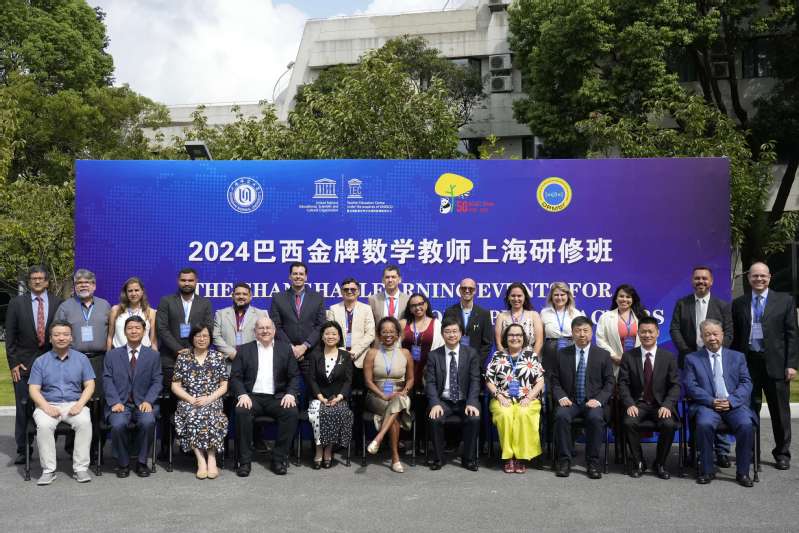
1. Origin of the Program
The concept of this program originated in 2023. In April that year, the Centre (also known as the International Teacher Education Centre of Shanghai Normal University) held discussions with Professor Jose Antonio Puppim de Oliveira—a senior expert at Brazil’s leading think tank Fundação Getulio Vargas (FGV) and founder of the Brazilian Mathematics Teachers’ Olympiad. The goal was to select outstanding high school mathematics teachers via the Brazilian Mathematics Teachers’ Olympiad to participate in a teacher professional development training program in Shanghai. In September 2023, a delegation from the Centre visited Brazil, including stops at the State University of Campinas, FGV, the Institute of Pure and Applied Mathematics, and several senior high schools. They also delivered a presentation at the National Congress of Mathematicians and Mathematics Teachers, aiming to strengthen ties with Brazilian mathematics educators and consolidate the professional community foundation of Shanghai Mathematics in Brazil. Meanwhile, accompanied by Counselor Wang Zhiwei from the Chinese Embassy in Brazil, the delegation held talks with relevant departments of Brazil’s Ministry of Education to secure high-level support for the China-Brazil mathematics teacher exchange program. The successful launch of the 2024 Shanghai Training Program for Brazilian Gold Medal Mathematics Teachers is the culmination of the aforementioned joint efforts.
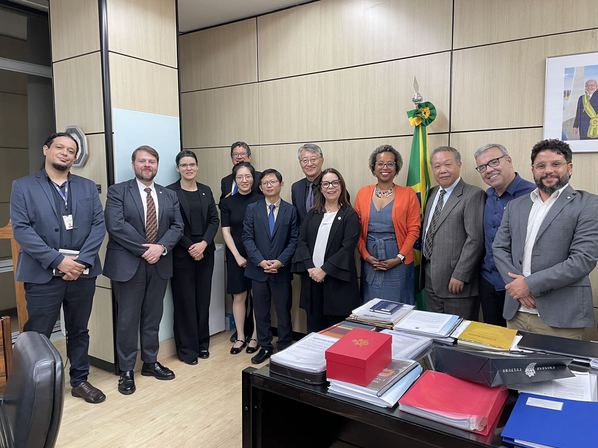
2. An Intercontinental Bridge for Mathematics Education
On September 15, 2024, 14 Brazilian scholars and high school gold medal mathematics teachers first arrived at Shanghai Pudong International Airport, where they met with Professor Jose, who was already in Shanghai for an exchange visit. Two days later, Dr. Katia Helena Serafina Cruz Schweickardt, Vice Minister of Brazil’s Ministry of Education, and Dr. Márcia Serra Ferreira, Head of Basic Education Teacher Training at Brazil’s Federal Agency for the Support and Evaluation of Graduate Education, also arrived in Shanghai to prepare for the program activities and other arrangements in the city. The following day, the program’s opening ceremony was successfully held, marking the official launch of this China-Brazil mathematics education exchange.
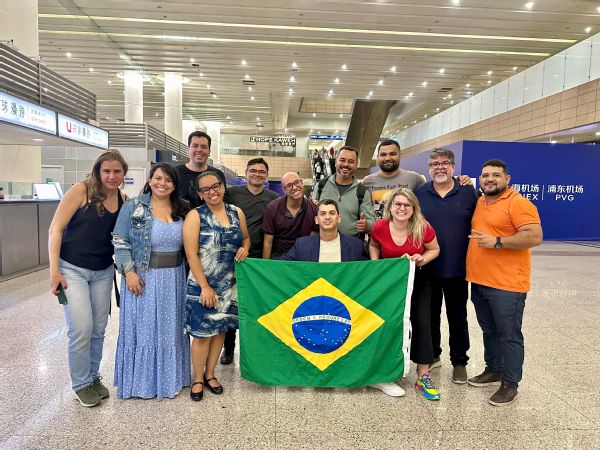
(1) Highlights of the Opening Day
After the opening ceremony on September 18, Professor Huang Hua, Senior Mathematics Teaching Researcher at the Shanghai Municipal Education Commission’s Teaching and Research Office, delivered a lecture titled Introduction to Shanghai High School Mathematics Curriculum and Textbooks for Brazilian mathematics teachers and scholars at the Shicheng Lecture Hall of the Centre. Meanwhile, the two Brazilian educational officials went to the Governing Board Meeting Room to attend a seminar on Shanghai’s digital education development. At the seminar, Director Han Chonghu of the Information Technology Division of the Shanghai Municipal Education Commission provided a detailed overview of Shanghai’s overall progress in digital education development, key priorities for smart education in primary and secondary schools, and the application of artificial intelligence in educational scenarios. He also joined Vice Director Zhou Li of the International Cooperation and Exchange Department of the Ministry of Education in answering questions of concern to the Brazilian educational officials.

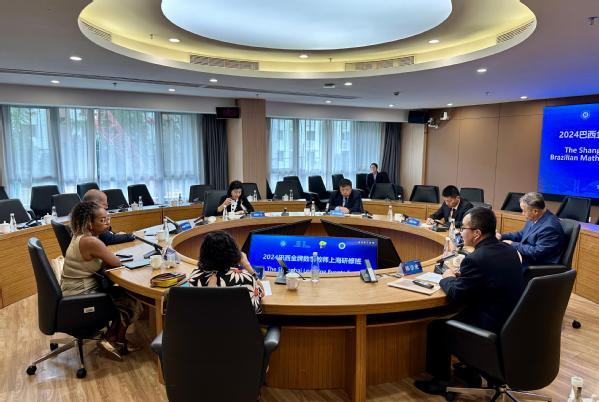
After the morning activities, the Brazilian teacher delegation and the educational official delegation visited Shanghai Experimental School and its International Department (Primary Section) respectively. During the visit, the teacher delegation observed a demonstration class titled Matrix Transformation via Graphic Calculators co-taught by Teachers Jin Yiming and Jin Min, gaining first-hand experience of the innovation and exploration of Shanghai mathematics teachers in applying digital technology in classrooms. Subsequently, the two sides held in-depth exchanges and mutual learning on topics such as school system, STEM curriculum development, and student career planning, further deepening their understanding of each other.
|
|
|
|
|
|
(2) Highlights of September 19
On the morning of September 19, under the guidance of Professor Huang Xingfeng, the Chinese Chief Expert of the program, Brazilian gold medal teachers and scholars jointly carried out cross-cultural teaching and research activities, focusing on discussions and reflections on the demonstration class observed at Shanghai Experimental School the previous day. Meanwhile, Dr. Cruz Schweickardt (Vice Minister of Brazil’s Ministry of Education) and Dr. Serra Ferreira (Head of Basic Education Teacher Training at Brazil’s Federal Agency for the Support and Evaluation of Graduate Education) were invited to attend an expert dialogue session titled Comparison of China-Brazil Education Systems hosted by the Centre. They engaged in in-depth dialogue with Professor Fan Guorui, Dean of the Faculty of Education at Shanghai Normal University, and delivered keynote reports. The three experts interacted with the audience on issues such as protecting the educational rights and interests of vulnerable groups, cultural similarities and differences between China and Brazil, and differences in school systems between the two countries, generating a warm response.
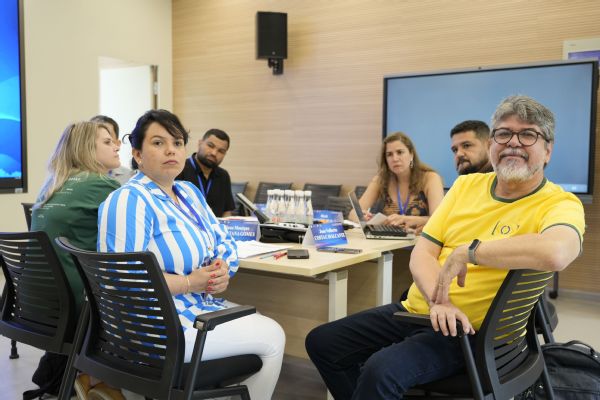
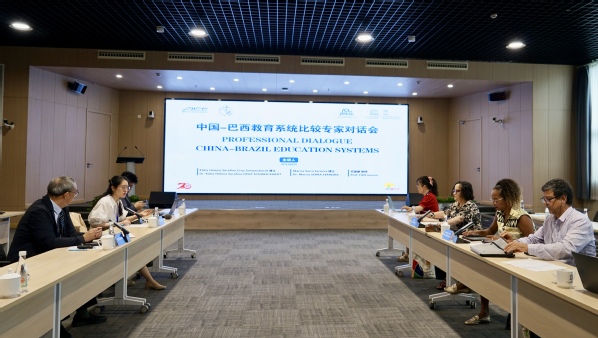
In the afternoon of the same day, the Brazilian delegation visited High School Affiliated to Fudan University. Principal Wu Jian of the school warmly welcomed the visiting Brazilian teachers, emphasizing that the school was eager to share best practices and experiences in mathematics education in a cross-cultural context to promote joint discussion and reflection among teachers from both countries. Dr. Cruz Schweickardt, Vice Minister of Brazil’s Ministry of Education, expressed sincere gratitude to the Centre and High School Affiliated to Fudan University for their thoughtful arrangements and exchanged gifts with Principal Wu Jian. After a brief welcome ceremony, the delegation observed a demonstration class titled Positional Relationships Between Lines and Planes (3) — Angles Formed by Lines and Planes taught by Teacher Feng Jing. After the class, they held a Q&A session with the school’s teachers, sharing their respective teaching experiences and suggestions. Following the visit to High School Affiliated to Fudan University, the delegation was invited to Fudan University to attend a seminar celebrating the 50th anniversary of China-Brazil diplomatic relations, hosted by the Fudan University Global Public Policy Institute. Professor Huang Xingfeng was invited to deliver a keynote speech at the seminar.
|
|
|
|
|
|

(3) Highlights of September 20
On September 20, the Brazilian delegation, led by Professor Jose, visited Lenovo Group. Later, accompanied by volunteers from the Centre, the two Brazilian educational officials visited Casa do Brasil (Brazil House) in Yangpu District, the World Skills Museum, and the Scientists’ Community, and attended the Yangpu-Brazil Roundtable on Sustainable Development Education Cooperation. After concluding their morning visit to Lenovo Group, the teacher delegation traveled to the Jiading Campus of High School Affiliated to Shanghai Jiao Tong University, where they observed a demonstration class titled Standard Equation of Hyperbola. During the observation, the Brazilian teachers used class observation forms and guidelines developed by the Centre’s team to carefully record their thoughts and insights, preparing for further discussions in post-class exchanges.
|
|
|
|
|
|
(4) Highlights of September 21-22
On September 21, the Centre hosted a seminar on mathematics curriculum and teacher professional development for the Brazilian delegation. Professor Huang Xingfeng (from the Centre), Professor Fang Yaohua (Teaching Researcher at the Shanghai Municipal Education Commission’s Teaching and Research Office), and Professor Paulo Regis Caron RUFFINO (from the State University of Campinas) delivered keynote reports respectively. Professor Huang Xingfeng’s report, titled Key Competencies in the National Curriculum, provided an in-depth analysis of the key competency requirements in the mathematics curriculum standards for compulsory education. Professor Fang Yaohua, in his report Interpreting the New Curriculum and Utilizing New Textbooks; Conducting New Teaching Research and Building New Resources, elaborated on how to effectively use the new curriculum and textbooks, and shared experiences in teaching resource development from the perspective of teaching research. Professor Paulo introduced the overview of mathematics teacher education curricula and training in Brazil, and shared Brazil’s practices and explorations in teacher professional development. After the reports, the three experts engaged in a lively Q&A session with Chinese and Brazilian audience members, discussing similarities and differences between the two countries in mathematics curriculum reform, teacher professional growth, and teaching resource development. Brazilian teachers actively participated in the discussion, raising many valuable questions and conducting productive exchanges with the three speakers on topics such as teaching methods and cross-cultural cooperation.
|
|
|
|
|
|
|
|
|
In the afternoon, Dr. Shen Yihua organized Brazilian teachers and scholars to discuss the Shanghai mathematics demonstration classes observed in the previous two days, and to design lesson plans for the demonstration class Power Functions that Brazilian teachers would teach two days later. During this process, the teachers not only discussed the setting of teaching objectives and the presentation of content, but also had detailed discussions on how to integrate digital technology into the classroom and how to stimulate students’ interest in mathematics.
|
|
|
|
|
|
The next day, the Brazilian gold medal teachers continued to refine their lesson plans and even organized voluntary small-scale teaching and research activities. They worked late into the night, preparing for every detail of the demonstration class to ensure excellence.
|
|
|
(5) Highlights of September 23
On the morning of September 23, 15 Brazilian teachers and scholars arrived at Shanghai Foreign Language School Affiliated to Shanghai International Studies University (SFLS). Vice Principal Yue Lan warmly welcomed the Brazilian delegation at the welcome ceremony and highly praised the cooperation between the two countries in mathematics education. She particularly mentioned that the demonstration class to be taught by Brazilian teachers was highly anticipated, and expressed hope that this exchange would promote mutual learning between Chinese and Brazilian teachers in educational concepts and teaching methods. As the Brazilian coordinator of the program, Professor Jose briefly reviewed the activities of the Brazilian teacher team in Shanghai over the past few days, and expressed hope that mathematics teachers from China and Brazil would establish long-term academic ties and cooperation mechanisms through this collaboration. The school also arranged students from its Portuguese language classes to receive the Brazilian guests, fully demonstrating its characteristics and strength in international education.
|
|
|
|
|
|
SFLS was also the venue for the Brazilian teachers’ demonstration class on Power Functions, co-taught by Roberto César CUCHARERO PEREGRINA and Silmara Louise DA SILVA. Notably, the topic of power functions is not included in Brazil’s high school mathematics curriculum, and the class was taught to unfamiliar Chinese students—posing significant challenges for the Brazilian teachers due to differences in language, culture, and curriculum content. However, during the official class, the two teachers successfully overcame language and cultural barriers with their solid teaching skills and flexible teaching methods. They actively interacted with students, fully demonstrating what they had learned during their time in Shanghai, and ultimately completed the teaching task excellently, winning high praise from both Chinese and Brazilian teachers and students.
|
|
|
Upon returning to the Centre, Dr. Shen Yihua organized the teachers to reflect on and discuss the day’s demonstration class. Everyone shared their views, providing many valuable constructive suggestions for further improving the teaching effect of this lesson.

(6) Highlights of the Closing Day
On September 24, the closing event of the 2024 Shanghai Training Program for Brazilian Gold Medal Mathematics Teachers was held in Classroom 101 of the UNESCO Teacher Education Centre. Professor Zhang Minxuan, Director of the Centre, attended and delivered a summary speech. He highly praised this China-Brazil mathematics education exchange, fully affirming the in-depth interactions between the two sides in mathematics teaching concepts, classroom practices, and teacher professional development. He expressed expectation that Chinese and Brazilian mathematics teachers would continue to work together to promote global educational innovation and development. Subsequently, he presented certificates to the Brazilian gold medal teachers participating in the program, in recognition of their outstanding performance during the training.
At the closing ceremony, Brazilian teachers also shared their gains and feelings. They stated that the training had not only broadened their professional horizons but also provided them with valuable teaching experiences through cross-cultural exchanges with Chinese teachers. This cross-cultural cooperation in mathematics education between China and Brazil had also inspired them to continue innovating teaching methods and improving classroom practices upon their return to Brazil.
With the conclusion of the closing ceremony, all activities of the 2024 Shanghai Training Program for Brazilian Gold Medal Mathematics Teachers came to an end. The next day, the Brazilian teachers boarded flights back to Brazil, bringing with them this unforgettable experience and newly acquired knowledge and insights to continue their educational careers. In the future, although China and Brazil are separated by thousands of miles, the educational exchange bridge built by this training program will continue to inject impetus into the cooperation and development of mathematics teachers in both countries.
|
|
|
|
|
|
3. Conclusion
As the two largest developing countries in the Eastern and Western Hemispheres respectively, China and Brazil are both firm supporters of the collective rise of the Global South and actively speak for developing countries under the frameworks of BRICS and the G20. The successful holding of the 2024 Shanghai Training Program for Brazilian Gold Medal Mathematics Teachers has expanded the cooperation potential between the two countries in mathematics education and marked another important milestone in people-to-people exchanges. This activity has not only promoted the professional growth of teachers in both countries but also actively explored solutions to the contemporary challenges facing mathematics education. It has laid a solid foundation for future educational cooperation between China and Brazil, demonstrating the determination and vision of the two countries to move forward hand in hand on the global educational stage.



